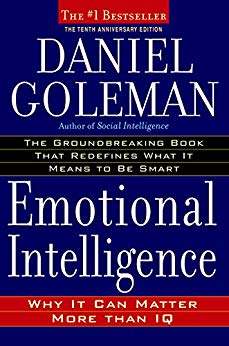

This article is an excerpt from the Shortform summary of "Emotional Intelligence" by Daniel Goleman. Shortform has the world's best summaries of books you should be reading.
Like this article? Sign up for a free trial here .
Want to raise an emotionally intelligent child with a high EQ? It all starts with the parents.
Our family is the first place we learn about emotions and how to handle them. Children learn not just through the things parents say, but the things they see parents do as well.
There are 3 common parenting styles that are harmful:
- 1) Ignoring feelings completely. This method leads children to believe emotions are inconveniences. These parents don’t use emotional moments as teaching moments, and they don’t usually develop closeness to their kids.
- 2) Being too accepting. These parents acknowledge their children’s emotions but don’t teach them acceptable and healthy ways of controlling their reactions to those emotions.
- 3) Treating emotions with contempt. These parents are harsh critics and disapprove of any emotional display. Ironically, they usually deal emotionally with their children, punishing out of anger and meeting emotional responses with bigger, more overwhelming emotional responses of their own.
What Parents Can Do
Parents who want emotionally healthy kids first need to work on their own emotional health. Setting a good example for your children is the first step you can take to better their future and raise an emotionally intelligent child
Then, parents need to encourage and help their children develop good emotional habits. This will lead to better academic performance, more social skills and better relationships, better performance in the workplace, and better health.
Parents who connect emotionally with their child healthily:
- Take their kid’s feelings seriously and try to understand them.
- View emotional moments as opportunities to coach their kids through what to do.
- Offer up positive ways to deal with emotional reactions.
- Practice these three steps in relation to their own emotional moments as well.
Here are the qualities a child needs to be the most efficient student and a successful person. Parents can help their children learn and practice these qualities for emotional intelligence:
- Confidence. Control over their behaviors, their bodies, and their environments, and a belief that they can achieve what they set out to do, and that people will help them.
- Curiosity. Taking pleasure in discovering things and learning about them.
- Intentionality. Wanting to have an impact and persistently acting upon that desire.
- Self-control. Controlling their own emotions and actions in appropriate ways.
- Relatedness. Engaging with others based on understanding them and being understood by them.
- Communication. Wanting to and being capable of exchanging feelings, ideas, and concepts with other people, trusting others enough to communicate with them, and taking pleasure in communication.
- Cooperativeness. Balancing their own needs versus the needs of others, specifically in group activities.
Raising an Empathetic Child
Learn more in our guide to empathy and kids, but here are key points.
Something that seems to have a big impact on which direction toddlers go in is how they get disciplined by their parents.
- Discipline that hinges on negative judgements of the offending child–”That’s naughty, you’re bad, don’t do that”–don’t teach empathy, they teach punishment.
- Discipline that hinges on explaining how actions make other people feel–”When you hit her, you made her sad. See how she’s crying?”–teaches empathy and builds a toddler’s awareness of other people’s feelings.
Another influencing factor is how their parents and other people react to emotional distress.
- Toddlers who are yelled at to stop crying will learn that this is how we handle emotions–we punish them.
- Toddlers who see their parents comforting people in emotional distress, allowing emotions to run their course, and discussing what these emotions are and how we can deal with them, will have a much more positive model of how to deal with emotions.
———End of Preview———

Like what you just read? Read the rest of the world's best summary of Daniel Coleman's "Emotional Intelligence: Why It Can Matter More than IQ" at Shortform . Learn the book's critical concepts in 20 minutes or less .
Here's what you'll find in our full Emotional Intelligence summary :
- What are emotions? Why do we have them?
- What is emotional intelligence? Why is it important?
- How do you manage your own emotions? Anger, anxiety, and sadness?
- How can you approach your relationships with more emotional intelligence?
- How can you teach your children emotional intelligence?
- How can emotional intelligence boost your career?






